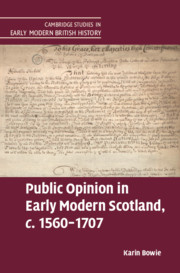Book contents
- Public Opinion in Early Modern Scotland, c.1560–1707
- Cambridge Studies in Early Modern British History
- Public Opinion in Early Modern Scotland, c.1560–1707
- Copyright page
- Contents
- Acknowledgements
- Abbreviations
- Introduction
- Chapter 1 Protestations
- Chapter 2 Petitions
- Chapter 3 Oaths
- Chapter 4 Public Communications
- Chapter 5 The Inclinations of the People
- Chapter 6 The Sense of the Nation
- Conclusions
- Bibliography
- Index
Conclusions
Published online by Cambridge University Press: 21 December 2020
- Public Opinion in Early Modern Scotland, c.1560–1707
- Cambridge Studies in Early Modern British History
- Public Opinion in Early Modern Scotland, c.1560–1707
- Copyright page
- Contents
- Acknowledgements
- Abbreviations
- Introduction
- Chapter 1 Protestations
- Chapter 2 Petitions
- Chapter 3 Oaths
- Chapter 4 Public Communications
- Chapter 5 The Inclinations of the People
- Chapter 6 The Sense of the Nation
- Conclusions
- Bibliography
- Index
Summary
Scottish representations of public opinion changed markedly between the mid-sixteenth and early-eighteenth century. While allegorical figures were used across this period to speak for the people and the kingdom, direct statements about the actual opinions of groups of people became more common. Though often overstated, these claims emerged from modes of engagement allowing ordinary people to form and express opinions on national affairs. Collective protestations, adversarial petitioning, covenant oaths and persuasive communications made it possible to imagine subjects holding informed opinions and to demand that governments take these opinions into account. While studies of the public sphere, print culture and popular politics have tended to focus on certain forms of communication or social groups, this study has aimed to explain the formation, expression and impact of public opinion. This historicisation of public opinion has revealed the growing importance of opinion politics in post-Reformation Scotland. Intense religious and constitutional anxieties stimulated pragmatic innovations in political practices as dissidents sought to weaponise opinion at large and the crown sought to regulate it. These dynamics produced a recognised, though contested and often instrumental, sense of Scottish national opinion, shaping events in the composite British monarchy and providing a framework for Scottish political voices in the post-1707 United Kingdom.
Keywords
- Type
- Chapter
- Information
- Public Opinion in Early Modern Scotland, c.1560–1707 , pp. 239 - 246Publisher: Cambridge University PressPrint publication year: 2020

